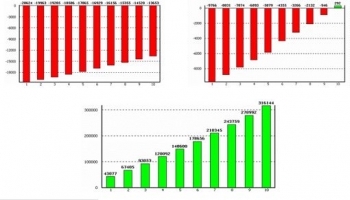What Is Negative Gearing?
 By definition, Negative Gearing is where you borrow to acquire an investment and the interest and other costs you incur exceed the income you receive from the investment.
By definition, Negative Gearing is where you borrow to acquire an investment and the interest and other costs you incur exceed the income you receive from the investment.
While Negative Gearing is commonly associated with rental properties, it can also be applied to other types of income-producing investments such as shares and managed funds.
In terms of property investment, negative gearing refers to the situation where your expenses to maintain an income-producing property exceed the rental income of the property. Positive gearing of an investment property refers to an excess of rental income over and above any running costs (including mortgage interest). The ultimate aim for most property investors is to build a portfolio of positively geared properties that also grow in value over time. Initially it is through negative gearing and the associated tax benefits that investors are able to purchase and accumulate real estate.
To illustrate the potential tax benefit of negative gearing let’s assume your rental property profit & loss statement looks like this:
| Rental Income – 52 Weeks @ $450 | $23,400 | |
| Interest - $350,000 @ 8% | $28,000 | |
| Water Rates | 968 | |
| Council Rates | 1,282 | |
| Insurance | 900 | |
| Repairs & Maintenance | 600 | |
| Agents Commission – 7% of $23,400 | 1,638 | |
| Bank Charges | 12 | |
| Body Corporate Fees | 1,000 | $34,400 |
| Net Profit (Loss) | $(11,000) |
The tax relief depends on who owns the property. If it is an individual who owns the property the loss can be offset against other assessable income and the tax benefit will vary based on your marginal tax rate.
The Risks
The attraction of borrowing or gearing to invest is that it enables you to invest in shares or property that might otherwise have been unaffordable. Make no mistake it can be a risky business because while gearing can amplify your gains, it can also magnify your losses.
Investors who negatively gear property need to understand some important points:
- Properties are expected to generate profits only through capital gains and the gains need to be greater than the total losses incurred over the course of the holding period. However, there is no guarantee that the value of the property will appreciate, or at least appreciate enough to cover your losses.
- For taxation purposes the depreciation on the property is tax deductible, however, accumulated depreciation on a property reduces the ‘cost base’ of the asset. Property that is appreciating may result in a large taxable capital gain. The greater the depreciation you apply on your property, the lower its value will be on paper.
- Investing in property requires careful planning. Extra caution must be exercised especially when a property is projected to generate a negative cash flow. In the end, tax benefits should not be the main reason for the property purchase. Investors have to remember that often a family home is a purchase from the heart while an investment property needs to be a purchase from the head.
You’ve heard the old saying that the three most important things when buying a home are, location, location, location ... and this is even more important when buying an investment property.
You should always seek expert financial advice to make sure the purchase is within your budget and will benefit you in the long run.
How We Can Help
When buying an investment property we can assist you in several areas:
- Where to buy – through the services of a buyer’s advocate we can help you locate the right property in the right location.
- Evaluate the tax consequences – Using a software program (Rent Manager) we can prepare a 10 year cash flow analysis of the property, taxable income forecasts and equity projections.
- Finance – through our affiliation with a mortgage broking group we can help you find the right loan that is correctly structured for tax purposes.

If you are interested in finding out more about negative gearing call our office today and make an appointment.
| IMPORTANT DISCLAIMER: This article is published as a guide to clients and for their private information. This article does not constitute advice. Clients should not act solely on the basis of the material contained in this article. Items herein are general comments only and do not convey advice per se. Also changes in legislation may occur quickly. We therefore recommend that our formal advice be sought before acting in any of these areas. |














